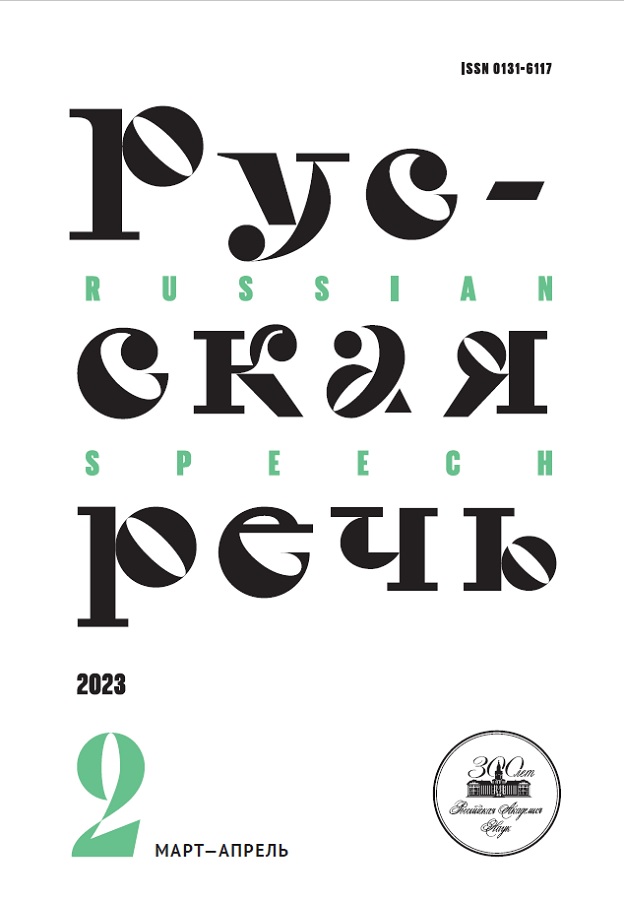Ya Oru s Tebya (“I Yell of You”): A New Guise of a Well-known Verb
- Autores: Leontyeva T.V.1, Shchetinina A.V.1
-
Afiliações:
- Ural Federal University named after the first President of Russia B. N. Yeltsin
- Edição: Nº 2 (2023)
- Páginas: 43-55
- Seção: Articles
- URL: https://kazanmedjournal.ru/0131-6117/article/view/652376
- DOI: https://doi.org/10.31857/S013161170025483-0
- ID: 652376
Texto integral
Resumo
The article is devoted to the emergence of neologisms in the Russian language through semantic derivation. The paper presents the case study of the verb orat’ (to yell), which illustrates the appearance of slang lexical-semantic variants of the word. The verb denoting screaming, crying and swearing in Russian literary language now functions in new meanings: ‘laugh’ and ‘experience indignation’. Constructions with this predicate mark the psychological state of a person (fun, joy, admiration, surprise or indignation), which has features of laughter Ya oru (I yell). The prominent specialty of this case is that the combinability of the verb does not correspond to the literary language norm. It has been established that in phrases formed according to a new control model, the new verb orat’ modifies nouns in the genitive case with the prepositions “s” “of” and “from”, while the genitive has the meaning of reason. A dependent word can be a designation of a person Ya oru s tebya / s druga / s Lekhi (I yell of you / of a friend / of Lyokha). It is noted that the slang verb orat’ began to be widely used around 2016, primarily in written formats of Internet communication, mainly among young people, although it can also be used in oral communication. The study reveals that the verb orat’ is mostly used in 1st person, singular (oru), however, the verb implements a complete inflectional paradigm in speech. The article gives assessment of derivational potential of the jargonism orat’ in the span of 5–6 years of functioning, the slang verb orat' acquired derivatives and became part of fixed expressions: proorat', ornut', orevo, orat' v golosinu.
Texto integral
Sobre autores
Tatyana Leontyeva
Ural Federal University named after the first President of Russia B. N. YeltsinRussian Federation, Yekaterinburg
Anna Shchetinina
Ural Federal University named after the first President of Russia B. N. YeltsinRussian Federation, Yekaterinburg
Bibliografia
- Доронина П. Д. О языке подростков в социальных сетях // Вестник Рязанского государственного университета им. С. А. Есенина. 2017. № 3 (56). С. 136–143.
- Дронов П. С. До потолка прыгать: лексико-грамматические изменения идиом семантического поля «Радость и удовольствие» // Научный диалог. 2018. № 12. С. 75–84. doi: 10.24224/2227-1295-2018-12-75-84.
- Евгеньева А. П. (ред.) Словарь русского языка: в 4 т. М.: Рус. яз.; Полиграфресурсы, 1999. Т. 2. К–О. 736 с.
- Заикина О. Н. Современный молодежный жаргон: актуальные процессы // Сборники конференций НИЦ Социосфера. 2019. № 38. С. 31–34.
- Иоанесян Е. Р. Симптоматическая лексика со встроенной эмоцией // Научный диалог. 2020. № 7. С. 91–104. doi: 10.24224/2227-1295-2020-7-91-104.
- Кронгауз М. А. Русский язык на грани нервного срыва. М.: Знак; Языки славянских культур; Литрес, 2009. 250 с.
- Крысин Л. П. (ред.) Толковый словарь русской разговорной речи. Вып. 4. С–Т. М.: Языки славянской культуры, 2021. 680 с.
- Кузнецова Е. Б. Зумеру – зумерово, бумеру – бумерово? Наблюдения за лексикой петербургских студентов // Печать и слово Санкт-Петербурга (Петербургские чтения – 2021): cборник научных трудов 21-й конференции, Санкт-Петербург, 24 апреля 2022 года. СПб.: Санкт-Петербургский государственный университет промышленных технологий и дизайна, 2022. С. 152–161.
- Милешина Л. В. Глагол в речевой коммуникации школьников // Экология языка и речи: материалы VIII Международной научной конференции, Тамбов, 21–23 ноября 2019 года. Тамбов: Издательский дом «Державинский», 2019. С. 305–311.
- Оспанова И. В. Номинации фонационных признаков выражения эмоционального состояния как средство эмотивной перцептуальности // Сибирское юридическое обозрение. 2011. № 15. С. 86–88.
- Подкина Ю. В. Особенности современной сленговой речи // Гуманитарные технологии в современном мире: сборник статей VIII Международной научно-практической конференции: в 2 частях, Калининград, 28–30 мая 2020 года. Калининград: РА Полиграфычъ, 2020. С. 161–166.
- Шведова Н. Ю., Лопатин В. В. (ред.). Краткая русская грамматика. М.: Русский язык, 1989. 639 с.









